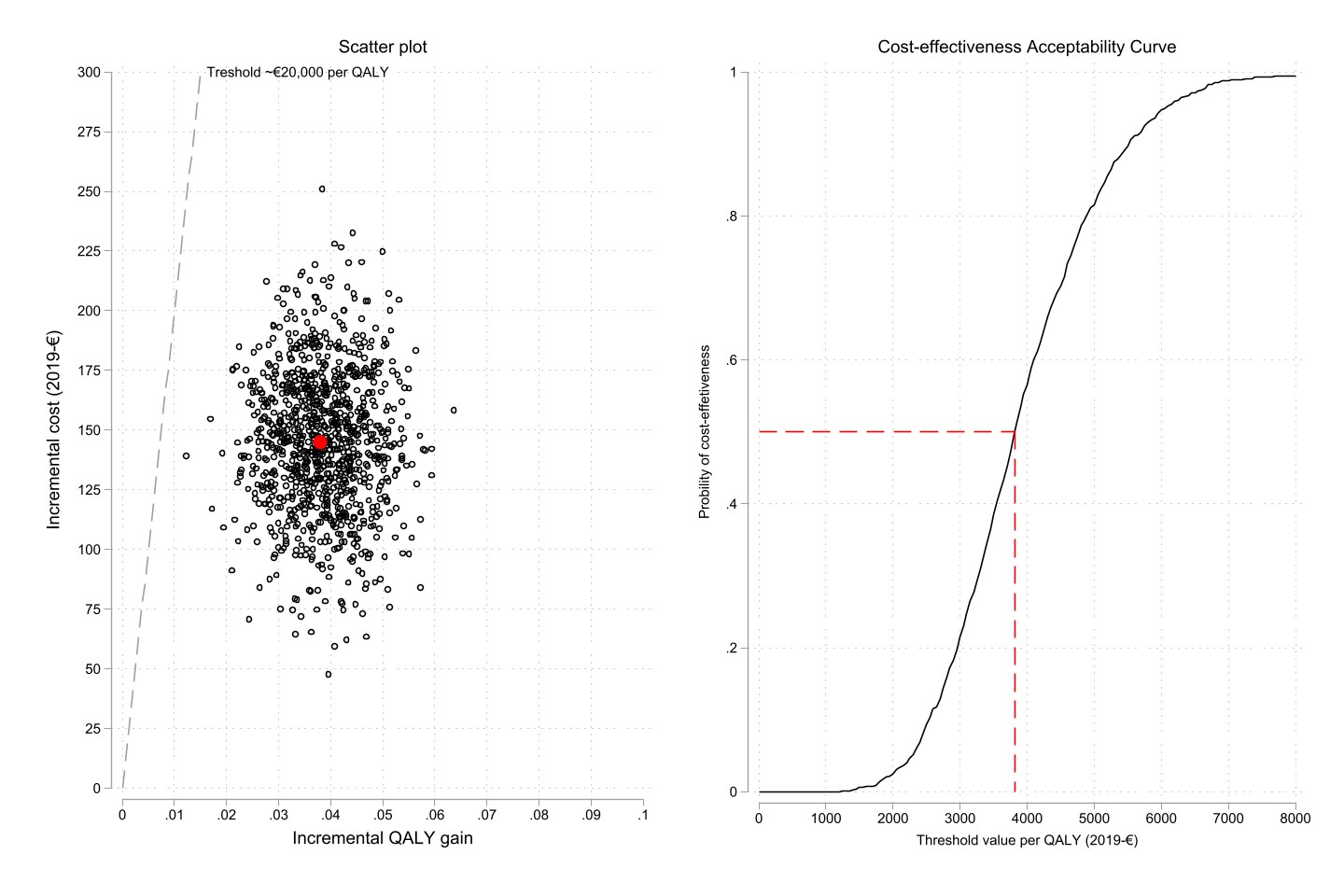Session Information
Session Type: Poster Session B
Session Time: 9:00AM-11:00AM
Background/Purpose: The “Joint Resources – Sedentary Behaviour” randomised controlled trial (RCT) (1,2,3) aimed to reduce sedentary behaviour in patients with rheumatoid arthritis (RA) by means of a 16-week intervention consisting of motivational counselling and text message reminders. The results showed significant between-group differences on behavioral, patient-reported and cardio-metabolic outcomes, both after 4 and 22 months. This secondary, protocolised cost-effectiveness analysis compared the intervention costs and improvement in HAQ and EQ-5D health utility between the intervention and control group.
Methods: Eligible RA patients (meeting the ACR classification criteria for RA) were randomised to the intervention (IG) or control group (CG). The healthcare perspective was applied for the cost analysis and outcomes were reported in terms of objectively measured daily sitting time, HAQ and EQ-5D scores during the 22-month observation period. Cost-effectiveness was reported as incremental cost-effectiveness ratios (ICER) and cost-effectiveness acceptability curve.
Outcomes were assed at baseline, at 4 months (after completed intervention), 10 and 22 months after baseline. Intervention mean cost included fixed planning costs and variable running cost. The incremental time weighted outcomes were related to the intervention cost. The ratio of intervention cost and gain in QALYs were illustrated in a scatterplot and cost-effectiveness acceptability curve.
Results: The intervention cost was estimated at €145 per participant. The difference in mean outcomes are shown in Figure 1. At follow-up the intervention group had shorter daily sitting time, better HAQ and EQ-5D scores. The time weighted outcomes and ICERs are shown in Table 1. Figure 2 shows A) the relation between bootstrapped intervention cost and incremental quality-adjusted life years (QALY) based on EQ-5D outcomes and B) the cost-effectiveness acceptability curve. These figures suggest that the intervention is cost-effective at a threshold value of €3800 per QALY.
Conclusion: This secondary, protocolised cost-effectiveness analysis was based on data from an RCT with high participation rates and good completion of return outcome measurements. The results suggest that the ICER of the individually tailored, behavioural intervention is €3800 per QALY which is well below traditional threshold values. These results suggest that the intervention is cost effective to implement in routine care.
(1) Esbensen BA et al. Trials 2015; 16:23
(2) Thomsen T et al. Ann Rheum Dis 2017; 76(9):1603-6
(3) Thomsen T et al. Arthritis Care Res 2019; sept 10
To cite this abstract in AMA style:
Sorensen J, Aadahl M, Hetland M, Appel Esbensen B, Thomsen T. Cost-effectiveness of Motivational Counselling and SMS-reminders on Daily Sitting Time in Patients with Rheumatoid Arthritis [abstract]. Arthritis Rheumatol. 2020; 72 (suppl 10). https://acrabstracts.org/abstract/cost-effectiveness-of-motivational-counselling-and-sms-reminders-on-daily-sitting-time-in-patients-with-rheumatoid-arthritis/. Accessed .« Back to ACR Convergence 2020
ACR Meeting Abstracts - https://acrabstracts.org/abstract/cost-effectiveness-of-motivational-counselling-and-sms-reminders-on-daily-sitting-time-in-patients-with-rheumatoid-arthritis/



